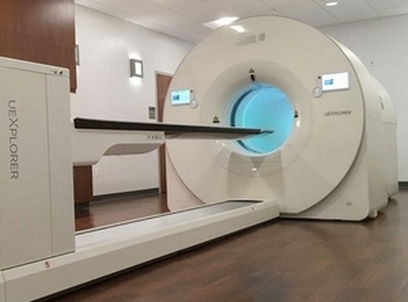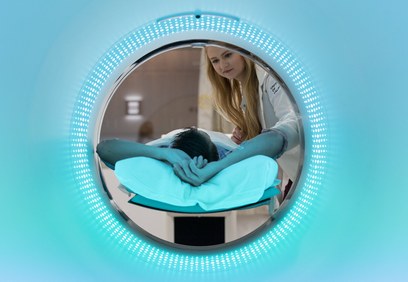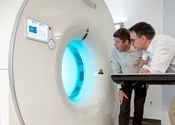EXPLORER Total-Body PET Imaging
 The EXPLORER scanner is a high sensitivity total-body positron emission tomography (PET) scanner useful for a wide range of biomedical research applications in human patients and volunteers.
The EXPLORER scanner is a high sensitivity total-body positron emission tomography (PET) scanner useful for a wide range of biomedical research applications in human patients and volunteers.
PET is an extremely safe medical imaging technique that can map out the location or track the movement of tiny amounts of radioactively-tagged compounds (radiotracers) after they are introduced into the body. There are thousands of PET scanners across the world performing millions of PET scans in patients each year.
The EXPLORER scanner has an effective sensitivity for total-body imaging that is 40-fold higher than current commercial scanners and is expected to open up completely new ways in which PET can be used in biomedical research and ultimately in clinical practice.
This massive increase in sensitivity can be used in a number of ways, for example:
- to perform scans at extremely low radiation doses (similar magnitude to the dose received from a round trip flight between San Francisco and London)
- to perform scans much more quickly (potentially in less than a minute)
- to track the fate of radiotracers for much more time after injection
 A broad range of total-body imaging applications exist for EXPLORER, including, but not limited to:
A broad range of total-body imaging applications exist for EXPLORER, including, but not limited to:
- very fast scans to avoid the need for anesthesia when scanning young children
- improved cancer detection
- studies of trafficking patterns in cell-based therapies
- very low dose evaluation of new drug pharmacokinetics in all the organs of the body
- studies of metabolic disorders, autoimmune disease and other chronic conditions
- toxicological research
- research into systems medicine, including endocrine and immunological signaling related to the brain-gut and hypothalamus-pituitary-adrenal axes which are implicated in a range of debilitating disorders including irritable bowel syndrome
The goal is to make EXPLORER widely accessible to the broader imaging and clinical research communities.
The EXPLORER Molecular Imaging Center (EMIC) operates using recharge rates approved by the University. Currently, the rates are as follows:
Study Start-Up and Research Administration
| Internal (UC)/Federally Funded: | $697 |
| External (not-for-profit): | $947 |
| External (for profit): | $1276 |
EXPLORER Scanner Time (Per Hour)
| Internal (UC)/Federally Funded: | $775 |
| External (not-for-profit): | $1054 |
| External (for profit): | $1475 |
Labor Rate (for staff time to support studies, Per Hour)
| Internal (UC)/Federally Funded: | $168 |
| External (not-for-profit): | $229 |
| External (for profit): | $320 |
Kinetic Modeling (Per Hour)
| Internal (UC)/Federally Funded: | $246 |
| External (not-for-profit): | $335 |
| External (for profit): | $469 |
Radiotracers:
Can range from approximately $100 to $5,000 per dose, please inquire. Passed through at cost.
To develop a budget for a study, please consult with EMIC staff, as scanning times and necessary staff support, as well as radiotracer costs, vary widely depending on the complexity of the study.
Contact EMIC staff

